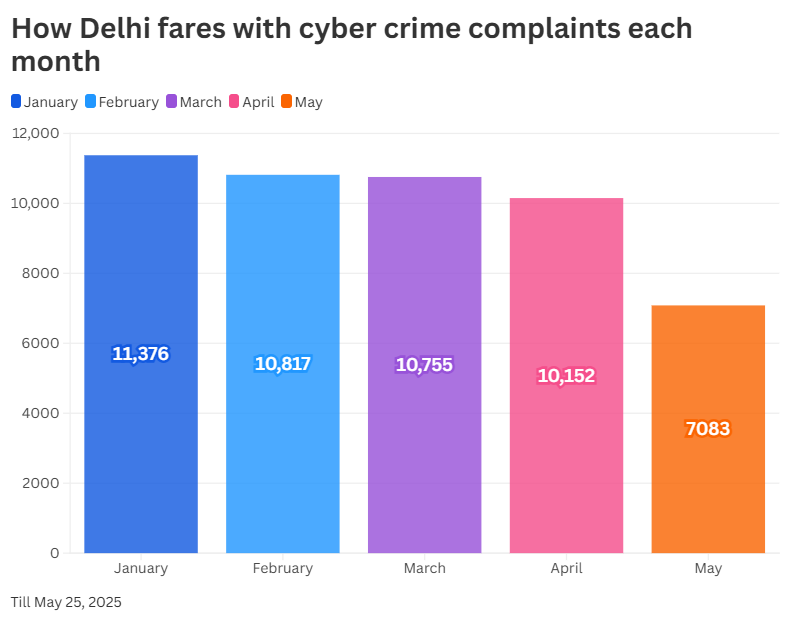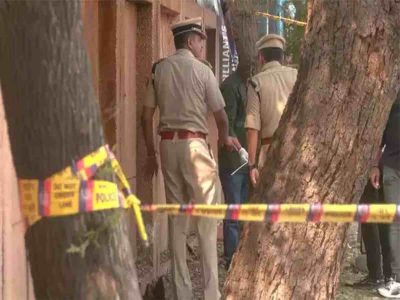From romance scams to fake investment schemes, cyber fraud in Delhi has spiralled to alarming levels. In just the first five months of 2025, Delhi Police recorded financial fraud cases totalling over Rs 473 crore—an amount that may only be the tip of the iceberg.
But it’s not only the direct victims who are facing the fallout. In some cases, even individuals with no involvement in scams find their lives upended after being caught in the crossfire of digital investigations.
Amit Sharma, a motorbike taxi driver from Dwarka, has spent the past month trying to get his bank account unblocked after it was flagged in a cybercrime case in Gujarat. “They said that my account was mentioned in the transaction history of the victim’s account. This eventually led the bank to block my account. I have been trying to get my account unblocked for the past 15 days, but it has yielded nothing. I visited the Cyber Police Station here, but their response remains the same — wait for action to be taken by Gujarat Police,” he said.
His ordeal reflects how the rise in cyber fraud is impacting not just those who lose money, but also unsuspecting individuals whose accounts appear in scam-related transactions, sometimes as part of fraudsters’ money-laundering operations.
Delhi’s worrying track record
From January 1 to May 25, the Intelligence Fusion and Strategic Operations (IFSO) unit of the Delhi Police, which oversees cybercrime in the national capital, recorded financial frauds amounting to over Rs 473 crore. Within just five months, IFSO registered 140 cases, of which 101 were related to financial fraud and 15 to so-called ‘digital arrest’ scams.
The remaining cases involved offences categorised as sextortion, matrimonial website frauds, investment scams, and deceptive work-from-home offers.
In comparison, from January 1 to July 20 in 2024, Delhi Police had investigated cases totalling over Rs 500 crore. This year’s figures appear poised to surpass that already significant benchmark.
While the volume of complaints has shown a marginal decline, the number of cases registered has remained largely consistent. In January, IFSO received 11,376 complaints, followed by 10,817 in February, 10,755 in March, 10,152 in April, and 7,083 in May (till May 25).
Recent financial frauds that shocked Delhi
On June 2, a healthcare professional residing in Delhi registered a complaint through the Cyber Portal with the Rohini Cyber Police Station. She alleged she had been defrauded by a man she met on Shaadi.com, who introduced himself as Vishwas Bhosle, a resident of Mumbai.
The complainant stated that after initiating contact, the two engaged in frequent communication via phone calls and messages. Over time, Bhosle allegedly gained her trust and, under false pretences, persuaded her to transfer approximately Rs 20 lakh to his bank account. The transactions were made in several instalments, citing investment opportunities or personal emergencies.
She had initially lodged a complaint on May 2, submitting transaction details including bank account numbers, transaction IDs, and dates. The matter is currently under scrutiny.
In another case, the Southwest Delhi Cyber Police dismantled a cybercrime gang that posed as officials from the Delhi Jal Board. The gang sent deceptive SMS messages warning victims of water supply disconnection unless immediate payments were made. Victims were tricked into downloading malicious APK files disguised as payment apps, which granted the fraudsters access to their banking information. This allowed them to carry out unauthorised transactions.
Three key operatives were arrested. Police recovered 13 mobile phones, a tablet, and digital evidence linking the group to 35 similar complaints in Delhi. The investigation revealed that the gang used fake SIM cards and a network of mule bank accounts to transfer the funds, some of which were then converted into cryptocurrency to evade detection. The case, exposed within a week of the initial complaint, highlights the growing use of malicious software in orchestrating financial frauds.
Police are now working with the Indian Cyber Crime Coordination Centre (I4C) to trace the flow of money and uncover potential international links, as similar fraud patterns have been connected to cross-border syndicates.
On May 28, the North East Delhi Cyber Police arrested four persons for defrauding a retired Air Force officer of Rs 49.28 lakh. The gang lured the victim through a WhatsApp group promoting fraudulent stock market investments. They convinced the victim to transfer funds in multiple instalments to various accounts, falsely promising high returns.
The police recovered four mobile phones and five SIM cards used during the crime. The suspects’ digital footprint suggested they operated from remote locations possibly linked to cybercrime hubs such as Mewat in Haryana or Jamtara in Jharkhand. Investigators have traced UPI transactions and are now working to freeze the involved accounts.
On May 27, in a coordinated interstate operation stretching from Jharkhand to Ladakh’s Sarchu, Delhi Police apprehended two fraudsters who laundered cybercrime proceeds through rural labourers’ bank accounts. The perpetrators exploited financially vulnerable individuals, using their bank accounts as mule accounts to transfer illicit funds, making it difficult for law enforcement to trace the origin.
These scams targeted urban victims—including Delhi residents—using schemes involving fake investments and digital arrests. The accused operated from remote, isolated locations to avoid detection and used encrypted messaging apps such as Telegram to conduct business. Police recovered several bank passbooks, SIM cards, and digital devices used to facilitate the transactions.
How to avoid such fraud
Rajneesh Gupta, Joint Commissioner of Police (IFSO), clarified that cyber fraud cases exceeding Rs 50 lakh fall under the IFSO unit’s jurisdiction. “Cases regarding amounts less than Rs 50 lakh but more than Rs 25 lakh are to be dealt with by the Crime Branch, and cases below Rs 25 lakh are supposed to be acted upon and registered at the 15 Cyber Police Stations established in all the districts,” he said.
Gupta emphasised that victims must first collect four key details before lodging a complaint: the victim’s own bank account number from which money was debited, the Unique Transaction Reference (UTR) number, the exact amount transferred, and the date and time of each transaction.
“What most people forget is the fact that mentioning suspect accounts or the cheater’s account and the conversation records which lured them into the trap are not essential at this stage and may not be noted while reporting on the 1930 helpline or to any police station,” he said.
Also Read: Breaking glass ceilings and law: Delhi’s women drug lords
“We only need the account number of the victim, the UTR number—which is typically 12 digits in case of UPI payments, 16 digits for RTGS, and 22 digits for NEFT payments. In case of credit cards, it is better to mention the linked or registered mobile number (RMN) as well. The amount and time and date of each transaction should also be provided. If there are multiple transactions, the cheated amounts must be listed individually, not clubbed together, and described in the order they occurred.”
 Gupta added that it is essential to register complaints either via the 24×7 helpline 1930 or by visiting one of the 15 Cyber Police Stations. Even a regular police station can register the complaint, as all are linked to the same 1930 portal.
Gupta added that it is essential to register complaints either via the 24×7 helpline 1930 or by visiting one of the 15 Cyber Police Stations. Even a regular police station can register the complaint, as all are linked to the same 1930 portal.
“Both these portals generate a 14-digit Acknowledgement Number starting with ‘3’. Such complaints are termed Series 3 complaints. On the other hand, victims can also report their cyber financial fraud complaints on the National Cyber Crime Reporting Portal of the Ministry of Home Affairs (MHA), acronymed as NCRP, whose website is https://cybercrime.gov.in. The acknowledgement number generated by this portal begins with the digit ‘2’, and such complaints are called Series 2 complaints,” he explained.
“The Series 2 complaints are immediately visible to the police in real time on the 1930 portal. These are reviewed by the police and, after verification, forwarded to the bank for lien marking on the cheated amount. Series 3 complaints, meanwhile, automatically go to the banks. By virtue of being entered by a police official, they carry a legal mandate and the banks can act immediately,” Gupta said.
A national crisis
The threat extends beyond Delhi. According to data presented by the Ministry of Finance in the Rajya Sabha, digital financial frauds across India surged to Rs 4,245 crore over 2.4 million incidents during the first ten months (April–January) of 2024–25. This marks a 67% rise from Rs 2,537 crore involving 2 million cases in 2022–23. In 2023–24, frauds totalled Rs 4,403 crore across 2.8 million incidents.
As cyber scams grow more sophisticated, law enforcement authorities continue to warn citizens: remain alert, report promptly, and never share financial information online without verification.





